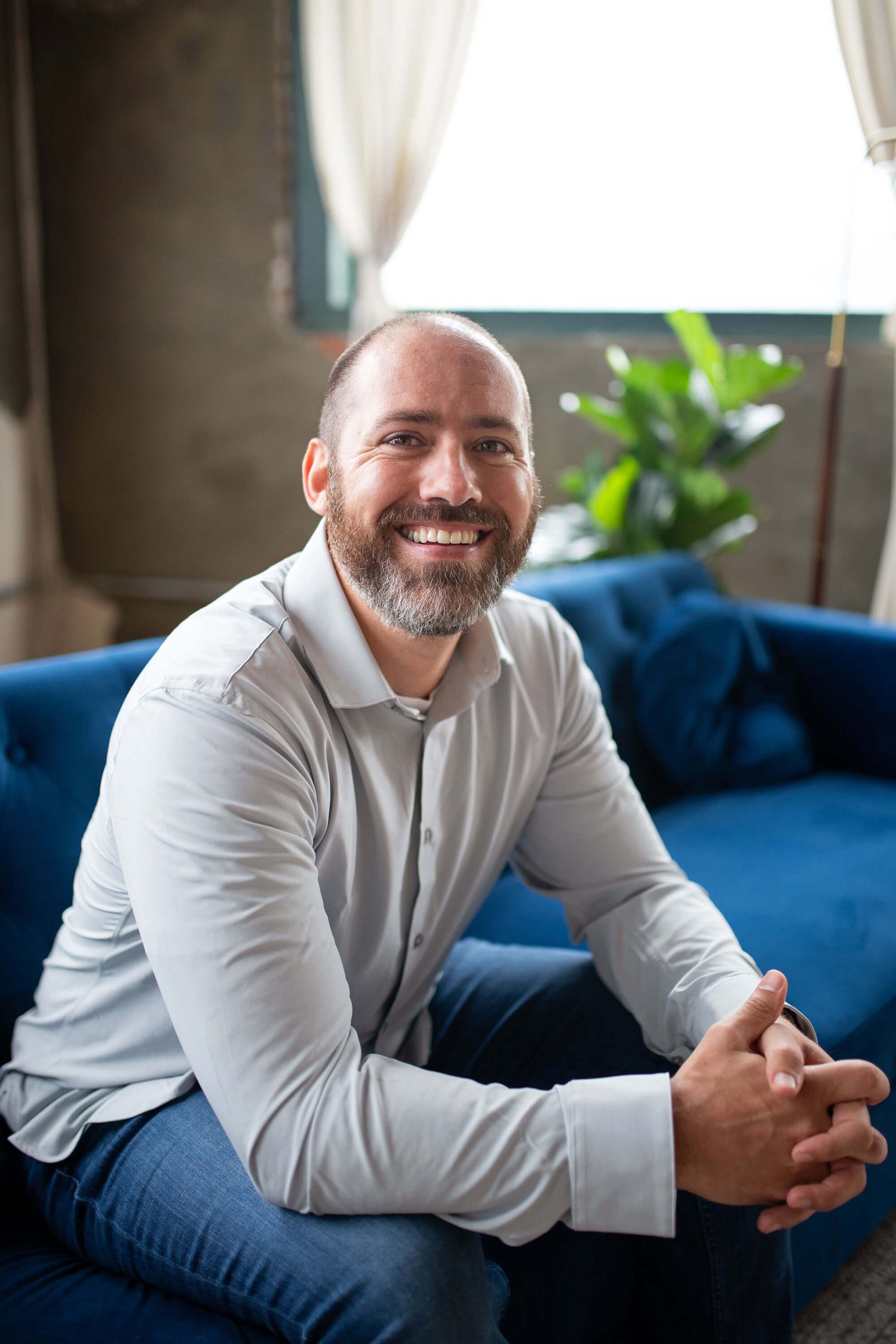How To Not Lose Yourself In Relationships
Welcome to the second part of our exploration into the nuances of self-identity and relationships. In this transcribed episode of The Shrink Think Podcast, Aaron Potratz and Nathan Hawkins dissect the concept of losing oneself in relationships and explore the complexities of maintaining individuality amidst companionship, while offering insights to reclaim and honor your true self.
If you missed the first half of this discussion, you can listen here.
Hey everyone, welcome to the ShrinkThink podcast. We are excited to be back today, finishing up an episode from last time about how to stay connected to yourself and like, what even is the self?
Who even are you basically? Who am I?
I don't know. Go to the Shrink Think podcast and send me a message to remind me who I am. If you know me, please find me help.
No, just kidding. We are finishing up the last episode where we were talking about like, what is self and how do you stay connected to yourself? And then in this episode, we're going to be talking about like ways in which you actually can lose yourself or lose connection to yourself and who you are, particularly in relationships with other people. Usually that kind of happens when you sort of take some steps away from what you believe or what you think or what your values are in favor of what the other person thinks or wants or needs. And so we're going to kind of flesh that out in this episode.
So stay with us. Thanks again for being here and enjoy the episode. Think in terms of core beliefs.
OK, so core beliefs are core beliefs. They are in your core. You believe them and some of them you don't even know.
Wait, that's a little confusing. Why do they call it core beliefs again? Oh, because of course, they're worried. Where is your core?
I'm not doing this. My abs. I did so much core workout. There is one way my core, your core beliefs are found in this region right here. Don't touch too much.
You are them. So there's things that you believe. And this is what we're kind of getting at, to some extent, too, that they're going to be challenged either because somebody else that you respect has a different belief. And when you see the way that they're doing that belief through their eyes, you kind of can't help but respect it.
So you're like, crap, you know what? Why do I do? Why do I care as much as I care about this other thing? Or it could be that you care about the person and you are afraid maybe and more likely, it's unrealistically afraid that you could do something to lose that connection or lose them if you disagreed with them or if you held a different belief than what they held. So there could be some fear that if I don't agree with their belief, if I don't align with them, then they're going to think something of me and either I'll lose the connection or they might judge me, reject me, not like me as much. And again, this could be real or it could just be my fear and I won't be able to tolerate that experience. Which would be what we're talking about in the whole idea of that would be a way that you lose yourself. It would be a step away. If you obey that, it would be a step away. It's about understanding your beliefs or maybe encountering them because I don't think that you need to understand everything that you believe like we're not born that way where we just all of a sudden understand all our beliefs like welcome.
This is who you are and you believe all these things. But when you encounter them, it's taking your own self seriously and your own life seriously and going, no, wait, I do believe this.
Why do I believe this? I'm going to go ahead and try this out. And if you realize in the moment that this other person kind of has formulated their beliefs more deeply than you, because they kind of answer more questions with that. It doesn't necessarily mean that what you believe is wrong, but it does mean it does. Well, it does indicate anyway that you probably haven't thought about it as much as they have. Or it could mean that you have thought about it, but you haven't clarified how important that is to you so that you're not holding on to it as tightly as you should, because you might be quickly letting go of it or abandoning it as soon as this other person presents their different belief in front of you. So it's like you might believe a and then they say B and you're like, OK, B, it's like you've too quickly let go of of your own thing in favor of what they believe, maybe because you believe that you're wrong and other people are right, which tends to be like an anxious attachment dynamic. Yeah. One of the common places this happens in relationship is around the area of faith and religion where people kind of, quote unquote, know not to do this, but that connection that they want is is so important to them. They will change the way that their faith works or they will have faith all of a sudden, you know.
No, no, I believe. Oh, yeah, I believe all that, you know, and and the person's like, well, I really want you to own it. I really want you because because, you know. That what you're really going for is this person that has their own belief system and believes this way and you really would like them to believe the same way as you like, but if they got to come to it on their own or whatever, and it's hard because it may be that the way your your belief system works in this example would be like, well, can I see myself with this person in five years the way they are? It's not like you don't accept who they are. It's more like does this jive with where you see your life going?
From who you are. I mean, that's where you're making the decision. You're not making a decision to lose them or abandon them. You're making a decision to keep yourself, which is not is not the same thing. So you have to deal with all those different challenges one way or the other. And in younger relationships, it's like you've got to take some of that more seriously than you are because you're compromising that stuff. And I would say, honestly, man, probably nine times out of ten, those relationships end up not working out because somebody comes to the conclusion like, oh, I guess I guess this does matter to me. So I don't know why I'm still here.
Like, this is never going to work. And what we're talking about in the loss of self is there's this whole period of time that you go through stressed out, not being yourself until you kind of snap back. And in some ways, there's some fail safes that we seem to have where we start to like at some point kind of wake up, you know, because we realize things. But my contention is you probably shouldn't wait for the fail safe. Right. Which is why, you know, just in the context of you're talking about, like dating relationships, for example, or just in relationships in general, it's so important to be yourself as much as possible at all times in every scenario. And of course, there are like appropriate ways of doing that. Like if you need to be in a professional setting, be a professional. Right. But be yourself, be who you are with your same personality, your same values, your same like ways of interacting with people. It's so important to be yourself because it gives other people an opportunity to see if they can.
and connect with you, be in relationship with you, and get along with you as you are. You don't actually want to be in relationship with people who cause you to pull, to come away from yourself.
Or are okay with it. Exactly! Because think about that.
If you're in a relationship with somebody, whether it's a friendship relationship or a romantic relationship, with someone who is okay with you losing yourself, they're essentially telling you, I don't respect you, I don't like you as you are, I want you or prefer you to be more like how I want you to be. And that's not really saying I like you and care about you as you really are.
You're a unique you? No, actually, I'm a unique me and I want you to be more like me. I want you to be my twin or something, right? They're not communicating a genuine value for you. Sometimes the journey to well-being feels overwhelming, but you don't have to walk it alone. Welcome to the Peer Network, where connection meets compassion through telehealth peer support. At the Peer Network, our certified support specialists are more than just trained professionals. They are individuals who have walked their own paths of recovery and resilience. They understand because they've been there. Imagine having someone who listens, relates, and supports you through your unique challenges, whether it's managing stress, navigating life transitions, or fostering mental wellness.
Our peer support is here for you. Accessible from the comfort of your own home, our telehealth platform brings you a personalized support experience. It's confidential, flexible, and centered around your needs and schedule. It's time to embrace a new kind of support, one that's rooted in empathy, shared experiences, and the belief that everyone deserves to be heard and understood.
Visit thepeernetwork.com today. Begin your journey with a companion who truly gets it. The Peer Network, where every step forward is a step together. And over time, what that's going to do in your relationship, like we're saying, is it's going to erode the connection. It's going to erode your authenticity. It's going to erode really just all the fundamental like trust and honesty kinds of things that you have in a relationship that make it sustainable and make it healthy and good. Whereas when you're yourself, just to put this on the the shoe on the other foot here, when you're yourself, you get to see how other people are with you.
And if somebody is not OK with who you are, that's OK. You just don't have to be in relationship with them. If we're talking about dating, this is very critical. You know, it's like I know I know you want to find somebody you want to, you know, find that relationship and and move on with your life, you know, and settle down or whatever the case may be. But you don't want to do that with somebody who causes you to lose yourself. You want to do that with somebody who actually likes who you are and supports and encourages you to be more yourself all the time, because that's the mutual giving kind of relationship that you're looking for. It's fulfilling. It's satisfying. You're not fighting against the other person or against yourself. You're just growing and blossoming maybe in who you are and confidence and security with who you are, which gives you more permission to say your opinions, to express your needs, to be open and more vulnerable, to have more intimacy in that relationship.
Well, and the openness and expression of your needs is vulnerability, right? So it's it's that idea of going ahead and just being you. As you're saying this, I'm realizing there's a kind of a crystallized and flexible component to this. So and if you are, there are dangers both sides of the coin. So a crystallized component, meaning you you you rigidly know what you believe.
There is no movement on it. You're not flexible whatsoever. It is this way. The end. That's like, well, that's who I am. Just take it or leave it. Right. It's like, well, that's kind of rude. Like you do need to grow and you don't like there's an arrogance to it maybe. And there's also kind of an immaturity to it, because the immaturity is this realization. Well, it's a lack of realization that you grow over time.
As time goes on, you have new experience. As you get older, you see the world differently and you should change and evolve along with that. Yeah. And in the other side of the coin is flexibility. And the problem with flexibility is that you can be too flexible.
Do you want me to be too flexible? I can be too flexible if you want me to be. That's OK.
I can be. Yeah, that's cool.
I'm super flexible. Whatever you need.
And then you can take advantage of that. Oh, you're and go outside and get me.
OK, I'll be right back. I also need one hundred dollars. Well, I don't have it, but I can go take on another job and do that for you. If you need this, just let me know if it's I need if it's what you need. Oh, I need so many things right now. But so the idea is, is that you can kind of see the fallacy on both sides of there. Right. But it's OK to have crystallized parts and ideas. It's just that you have to have both. You have to have the flexibility because you have to be able to know where you're willing to compromise.
And you don't have to. I'm like speaking out of the bullseyes of my mouth. You do not have to know that up front. You have to be able to encounter it when somebody is saying, I don't think I agree with you. If you're coming from a very crystallized place, your response is going to be by the bad. You're wrong. I'm right. The relationship is over, you know, and honestly, that would be loss of self. And it would be loss of an opportunity to grow also be right. Just because somebody has a different opinion or different belief doesn't mean you can't sharpen or clarify what you think and believe in the conversation. In fact, that can be a really good thing to have the difference of opinion in a relationship because it can actually make both of you more yourselves if you give it the opportunity.
I remember there was this old supervisor that I had, and I mean, that's what we called him. He's old, like 70s or I hope the guy's still running around. But he was working on a research book. He would come into the office and be there at 4 a.m. And all he was doing is writing. Anyway, long story short, he retired and he still is working on that book. Good Lord. I bet she's still working on the book. And I got a bunch of people. I couldn't help it. I was just picturing if he's not, he's like in a coffin somewhere. But his hand is out with a pen in it. It's like out of the coffin. It's on the paper, like still writing. It's still right. It's still going. His body's dead, but his hand is still working somewhere.
Oh, my gosh. And I invited him because he's just freaking brilliant in the way that he looked at things. I invited him to a supervision group, like out of retirement. Like, hey, can you come and talk to us about these different concepts that you're going through? And so he puts this thing out there. I don't even remember what it was. But one of my colleagues goes, I disagree with you.
And he goes, thank God. He goes, OK, good.
Like, tell me, because he's because he's in his own opinions in mind and thinking about everything that's going on. And the reality is what he was craving is there was no real feedback from anything except for a book. So it's like you can't interact. Right. And that's really it was it was a really cool picture for me.
I never forgot that to like, wow. You know, there's a huge value in meeting that. Like he was not remotely crystallized in this thing. I mean, he definitely thought it was the way that it was, according to the research he had done. But when when she said that, he moved right into flexibility to go like, OK, let's let's really figure this out. He was not saying I'm going to abandon all this. I'm going to move away from it. I know I now no longer agree with what I thought, because you just said that. Right. That's not what happened at all.
Yeah, I can relate to that. I have I know when my clients will say this, they'll say something. And, you know, because in this context, we're kind of exchanging ideas and sometimes they'll have different beliefs or whatever. I have this initial in my experience of this initial moment of like, oh, no, you disagree. You know, there's this sort of fear or this like discomfort with like the disconnection or being at a different place. But I've learned how to tolerate that. And I'm like, OK, take a breath.
And it's like, OK, that's OK. I take a moment to like reflect on what it is that I believe. And then I'm also and this is all within the matter of a couple of seconds. Right. The other person explains what they believe. And I actually find myself saying to myself and then even out loud after that, I really appreciate this because I like thinking about things in a different way. I like exploring alternatives that I haven't thought of before because I don't want to come to a conclusion in myself. That's something I believe. But there are these other possibilities that might actually be more of what I believe that I just wasn't even willing to consider because I thought, oh, this is what I believe.
I'm too rigid. Sometimes people have helped me clarify, maybe just take what I believe and nuance it a little bit more or take it in a slightly different direction or apply it more specifically or more broadly that better reflects what I actually believe. So those instances can be really helpful. You know, there have been sometimes also where somebody has said something and I'm like, wow, I've never actually thought about that. Wow. I need to actually rethink what I believe in light of that. That doesn't mean I'm going to abandon what I believe. It just means there is some new information here that I need to update my system with. And there is, as we're talking about, not losing yourself. It's this idea of being able to be present and then having the courage to fight for the clarity. Like you might, for example, believe you need to be a good person and good people are respectful.
OK, that's a very normal, very healthy way to look at things. But maybe you've never actually been in a situation where you've had to employ that in a place or a time when somebody that you have no respect for as far as what they believe, you just have never thought about it. Maybe somebody on the other side of the political aisle or something that you're like, I can't believe they would ever think that is saying or doing something. And in order for you to maintain this core belief of being a good person who's respectful, you now have to do something or say something according that you have to challenge it. Right. You just believed that that was not you haven't really employed it in situations that are difficult, like that were. Where you maybe don't care, quote, unquote, like, how do I be respectful in a situation?
That's like toxic or that's, um, confrontive or that's abusive. I mean, these are extreme words, but maybe it doesn't have to be quite as intense as that.
But how do I employ that belief practically? How do I be respectful in a situation with somebody who's not being respectful back to me? Right. In our day and age, what the culture struggles with is with this whole, and we've talked about it in a different podcast, this idea of being offended is like, it's a crystallized way of looking at things because what's happening is I'm offended. So that means you need to change.
That is the vibe, big picture. I'm not saying one side or the other out there. Cause I know that this is a whole topic. One of my point is, is that that culture wise corporately, the group think behind that is yep. Change because it just, I don't like it. Only one of us can be connected to self.
And that's going to be me. You need to change because if you are different than me, then yourself is not okay. Judgment. Yeah. I mean, it's essentially what's happening. So just to kind of wrap this up here, the thing that I guess if I can give you a tool, I would love to say, take time to think about what matters to you and like, what are your values? You know, think down, think about, you know, what is important to you, who you are and your relationships, you know, what virtues and characteristics and traits are important to you. And then try to live those out. Adhere to those. I know that sounds very broad and also like that's a big project. That's a big undertaking, but that'll help you to know yourself.
And then in the moment, in the moment, what I always try to tell people is try to think critically for yourself. When somebody else is presenting their opinion, it's really, really easy. Even for me, somebody who has pretty strong opinions and I'm pretty clear with myself, it's easy to just dismiss it or it's easy to be like, oh, okay, I believe what you, what you think, you know, to go one extreme or the other. Instead, I try to encourage myself and encourage other people to pause and to think, okay, they're saying this.
Do I agree with that? What do I think about this? What thoughts do I have about it?
Not that I'm necessarily right or wrong. I'm just trying to be clear about who I am and what I think about it. And then I can present that in the conversation, or at least just to know, I've heard this and I think differently about it now I know, and I've preserved myself and my connection to myself based off who I know that I am and what I think and believe. At the risk of belaboring what you just said, to clarify it a little bit, it would be like, what you're saying is you have your belief, but you're going toward the other person.
You're not trying to protect your belief outright. You're trying to be very curious about where, how did they even get where they are? Try to really actually understand it and hold that. That doesn't mean you're walking away from what you believe. It just means like, you're really trying to understand them. You're trying to be curious and you're open to them. And then you might end up going like, Hmm, I mean, uh, this is interesting other side. I'll give you a really, really short and fun example. As we close up here. I was doing a gingerbread houses and my kids several years back, we're decorating them.
And my oldest son is far more creative than I am. I was found myself literally following the example on the box. I was like, I could do that. And he was like creatively making something new. And I was like watching him. And I was like, huh, that's interesting. How did you, what made you think to do that? And it just was, and it just sparked some of my creativity and curiosity, um, to maybe do a, something a little bit different on my own. I didn't abandon what I was doing and I wasn't trying to protect my own. I just was looking over and be like, Oh, that's interesting.
That's a different way of doing it. I kind of like that. I think I would like to do something a little bit different on my end. So it's a really silly example, but it was this, you know, stepping away from exploring and then coming back to myself to, to do what I wanted to do with my own gingerbread house. So more specifically, and lastly, Aaron gave the broad idea of before of kind of like taking a, taking a moment and looking at kind of what you believe to even potentially make that more specific to give you a place. As we close up, think of a relationship that you have some tension in. I'm not talking about your most intense thing that's going on. I'm talking about. Where you are kind of like, uh, you kind of have a little bit of, and then try to go ahead and jump off and then say, what do, why do I feel that way? What does that feeling start with naming the emotion, naming the feeling, and then start to just be curious about it and be curious about what comes up in your mind. When you consider the emotion and the feeling, I bet it will be a memory.
It'll be something that you will remember a specific communication that happened. What you can assume in that is that that communication was important to you. It, it essentially needs to be integrated somehow. So that's kind of where you start focusing on yourself. Don't lose yourself. It has to be very breathy. Okay. I won't lose myself.
How do you want me to be? Have a great day.
Thanks for listening to our show. Don't forget to head over to Apple podcasts, Spotify, Stitcher, or wherever you get your podcast to leave us a review and subscribe to our podcast. So you never miss an episode. You can also visit our website at www.shrinkthink.com, and sign up for our free email course, Nine Ways to Overcome Fear and Self Doubt. And you'll get nine weeks worth of customized practical strategies you can use to get past the fear that's holding you back in your life. Thanks again for listening.

Aaron
Aaron brings incredible passion, authenticity, and humor to all that he does - whether by providing care in his clinical practice or offering guidance in his consulting business. Aaron is a Licensed Professional Counselor and Clinical Supervisor in Oregon, the owner of Discover Counseling, and co-owner of Life Discovery Counseling Services. He maintains his own client caseload while managing his group practices and supervising his counseling staff. Aaron is also a private practice consultant and co-hosts the Shrink Think Podcast with Nathan Hawkins.




